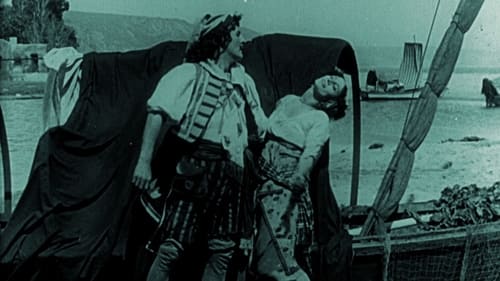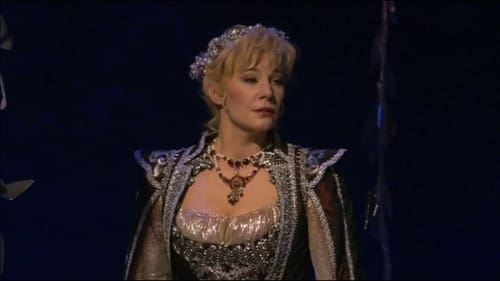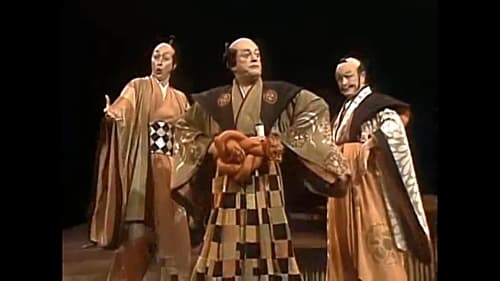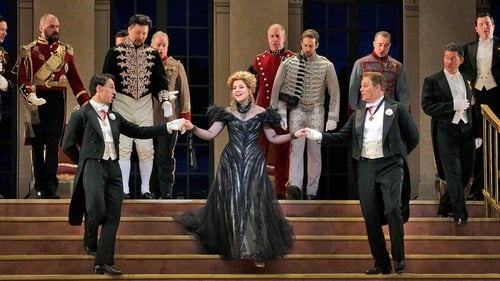Mam'zelle Nitouche (1977)
Género : Música, Comedia
Tiempo de ejecución : 0M
Director : Václav Tomšovský
Sinopsis

Fenella, a poor Italian girl, falls in love with a Spanish nobleman, but their affair triggers a revolution and national catastrophe.

In 1890, Gus Sascher joins the Austrian Army and romances the impoverished girl Elsa Hofner. Elsa instead marries the wealthier officer Franz von Renner, in an attempt at social climbing.

Zurich Opera House production of Franz Léhar's operetta, with Dagmar Schellenberger, Rodney Gilfry, and Ute Gfrerer in lead roles. Baron Zeta is desperate that the fabulously wealthy widow Hanna Glavari marry a Pontevedrian man so that her fortune remains in the country. He attempts to match her and his handsome attaché, Danilo. It turns out that Danilo and Hanna had had a love affair in years past. Nevertheless, Danilo now refuses to love her because he doesn't want to appear like he is only interested in her money...

Kálmán Imre's beloved operetta comes to the screen in this comedy of music, marriage and class set in Budapest and Vienna before the outbreak of the First World War, recorded at the Budapest Opera in 1963.

An adaptation of the operetta The Flower of Hawaii by Paul Abraham. It is based on the life of the last Queen of Hawaii Liliuokalani.

Out of unlikely circumstances an underground ticket vending girl and a mail pilot fall in love.

In a mythical Japan, Ko-Ko, a cheap tailor, has been appointed Lord High Executioner and must find someone to execute before the arrival of the ruling Mikado. He lights upon Nanki-Poo, a strolling minstrel who loves the beautiful Yum-Yum. But Yum-Yum is also loved by Ko-Ko, and Nanki-Poo, seeing no hope for his love, considers suicide. Ko-Ko offers to solve both their problems by executing Nanki-Poo, and an agreement is reached whereby Ko-Ko will allow Nanki-Poo to marry Yum-Yum for one month, at the end of which Nanki-Poo will be executed, in time for the arrival of the Mikado. But what Ko-Ko doesn't know is that Nanki-Poo is the son of the Mikado and has run away to avoid a betrothal to an old harridan named Katisha. The arrival of the Mikado brings all the threads of the tale together. This is the Stratford Festival of Canada, directed by Brian Macdonald. This is a filmed version of a stage performance, and the sets are beautifully spare and economical.

Ottilie Van Zandt is forced to wed her cousin, despite her love for Richard Wayne, the gardener's son. Richard leaves, vowing to return a wealthy man and eligible suitor for her. He returns to find she has already married and, in turn, marries another girl on impulse. Two generations later, the grandchildren of Ottilie and Richard, who both have inherited their names as well, meet and develop a close friendship that culminates in the romance that their grandparents began but could not consummate years before.

The story: While her husband is becoming famous in the war, the marshal of Werdenberg's wife consoles herself in the arms of the youngster Octavian and tries to arrange the love affairs of her cousin, the baron Ochs, by presenting him to young Sophie. This baron is taken with her and the Marschallin proposes Octavian to be his "Rosenkavalier" in order to present the traditional silver rose to his fiancée. But youngsters are youngsters and sex hormones hold sway over the whole world so for that reason immediately Octavian and Sophie fall in love with each other…

French General Birabeau has been sent to Morocco to root out and destroy the Riffs, a band of Arab rebels, who threaten the safety of the French outpost in the Moroccan desert. Their dashing, daredevil leader is the mysterious "Red Shadow". Margot Bonvalet, a lovely, sassy French girl, is soon to be married at the fort to Birabeau's right-hand man, Captain Fontaine. Birabeau's son Pierre, in reality the Red Shadow, loves Margot, but pretends to be a milksop to preserve his secret identity. Margot tells Pierre that she secretly yearns to be swept into the arms of some bold, dashing sheik, perhaps even the Red Shadow himself. Pierre, as the Red Shadow, kidnaps Margot and declares his love for her.

In the Temesvar Province, a landowner returned from exile marries a gypsy girl who is revealed to be the daughter of a Turkish Pasha and the rightful owner of a hidden treasure. Next to "Die Fledermaus", DER ZIGEUNERBARON is Johann Strauss’s most popular operetta. The libretto gave Strauss the chance to revel in such contrasting musical forms as the Csárdás and the Viennese waltz. The style of the lied forms and ensembles is so original and finely balanced that the "Gypsy Baron" can truly be called a comic opera. Among the leading names of the stellar cast in this exuberant 1975 film of the operetta are Wolfgang Brendel, Ivan Rebroff, Janet Perry, Ellen Shade, Martha Mödl and, in the role that launched his career, Siegfried Jerusalem as Sándor Barinkay.

Renée Fleming lights up the Met stage as Hanna Glawari, the fabulously wealthy widow of the title in Lehár’s beloved operetta, set in Paris and seen in a glittering production directed and choreographed by Broadway’s Susan Stroman. Nathan Gunn is Danilo, Hanna’s former flame, who is supposed to woo and marry her in order to keep her fortune in their home country of Pontevedro. Kelli O’Hara sings Valencienne, the flirtatious young wife of the Pontevedrian ambassador in Paris, Baron Zeta, played by Thomas Allen, and Alek Shrader is her suitor, Camille. Andrew Davis conducts the waltz-rich score, and the new English translation is by Jeremy Sams.

This outdoor performance of Carl Zeller's celebrated operetta was staged at the Seefestspiele Mörbisch in 1998. Seefestspiele Mörbisch is an operetta festival held annually at Mörbisch am See in Austria. In the story, Adam, a handsome bird-seller from the County of Tyrol, finds himself in the Rhineland, where he and a village postmistress become entangled in various romantic intrigues and misunderstanding at the prince's court.

In this three-act operetta by Hungarian composer Emmerich Kálmán, a dashing and mysterious circus performer is hired by a disappointed suitor of Princess Fedora Palinska to pose as a nobleman and marry her. This 1969 performance was produced for West German television.

Vienna, Austria, late 1870s. After suffering an irreparable misfortune, the Austrian composer Johann Strauss Jr. (1825-99), the Waltz King, falls in love with a ballet dancer, which disappoints the famous operetta singer Marie Geistinger…

The heroic Koroghlu is a poor youngster who leads a peasants' revolt against the tyrannic Khan.

A shy young man with a passion for opera has his world turned upside down by a con artist who really does have a heart of gold.

Young Austrian Archduke Paul "Gustl" Gustave is in an arranged engagement but his uncle, the emperor, decides to let Gustl carry on a fling with ballet dancer Lisl Gluck.

Johan Strauss Eine Nacht in Venedig (1883) together with Die Fledermaus and Die Zigeunerbaron, has long been among the three most popular of the more than a dozen operettas composed by the 19th c. Waltz King. This Rudolf Bibl conducted performance was recorded live during the Seefestspiele Moerbisch Austria Festival in 1999 and features Marc Clear, Gideon Singer, Evelyn Schörkhuber , Ingrid Habermann, and Anton Steingruber.
















